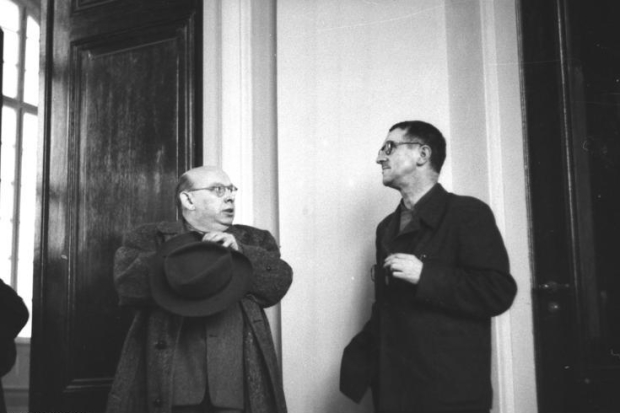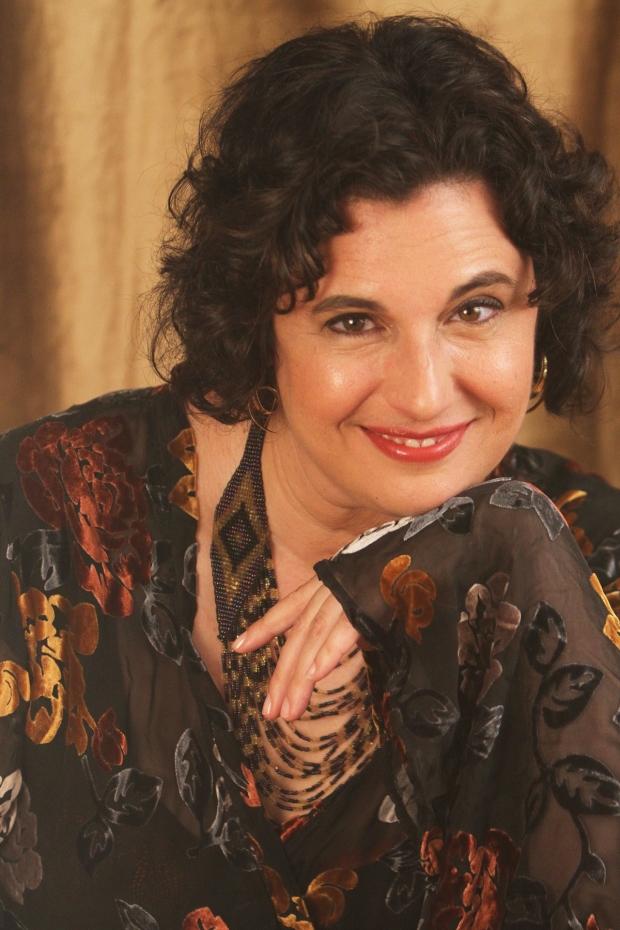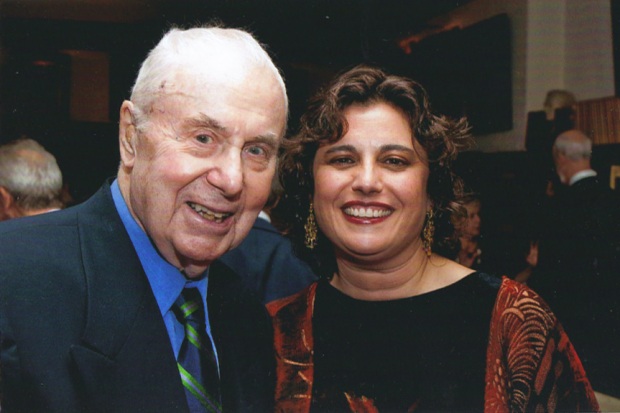Bertolt Brecht, Eric Bentley, and the Strange Connection Between the Accordion and Lust

(© Bundesarchiv, Bild 183-19204-2132 / CC-BY-SA 3.0)
At the height of World War II, critic Eric Bentley met German playwright Bertolt Brecht while he was living in exile in the United States. Bentley helped the author of Mother Courage and The Threepenny Opera mount the New York debut of The Private Life of the Mater Race, Brecht's musical collaboration with fellow refugee Hanns Eisler about fear and misery in the Third Reich. "It was a disaster," Bentley writes in the preface to his book The Brecht Commentaries.
While Brecht and Eisler's openly Marxist plays failed to take hold in a United States increasingly gripped by Cold War paranoia, Bentley never gave up championing their work. In fact, it was Bentley who introduced soprano Karyn Levitt to the collaborations of Brecht and Eisler over half a century later.
Now Levitt has a new album of Bentley's translations of songs by Brecht and Eisler (many of them never before recorded in English) called Eric Bentley's Brecht-Eisler Song Book. Levitt spoke with TheaterMania about her roundabout journey to this music, the extraordinary historical context behind its composition, and "embracing the darkness."

(Courtesy of Karyn Levitt)
Why Brecht and Eisler?
Kurt Weill, who composed the music for The Threepenny Opera drew me to Brecht, which then drew me to Eric Bentley. I adored Weill's music, but I was afraid of Brecht. Reading his work is like standing at the edge of the abyss. In corresponding with Eric Bentley, he urged me to consider other composers who had worked with Brecht, but were not well-known in America, specifically Hanns Eisler, who was a student of Arnold Schoenberg. That's how I came to record this album. Now I love Brecht: I've embraced the darkness.
That's remarkable considering Brecht's collaborations with Eisler are so much darker than with Weill.
Weill is a romantic at heart. There's an incredible clash between Weill's dark romanticism and Brecht's ruthless lack of sentimentality. If you read The Threepenny Opera, it's a very dark play. You almost couldn't take it, but Weill's music makes it delectable. It's like a spoonful of sugar to help the medicine go down. There's a contradiction there that is not intellectual, but emotionally thrilling. Eisler's music is much more in line with Brecht's tone. Like Brecht, he's unsentimental, but lyrical. You don't have that buffer between you and Brecht's darkness.
How did they come to compose the songs you sing on the album?
They were working together in the early 1930s. Their collaboration was well-established by the time each of them independently fled Nazi Germany in 1933. They went in separate directions and had very different routes to their ultimate destination of the United States, to resume their working relationship in Hollywood. It's unfortunate that as a casualty of the cold war politics, Americans aren't very familiar with Eisler's work. He's an extraordinary composer who wrote some very sophisticated atonal songs.

(Courtesy of Karyn Levitt)
After he returned to East Germany following the war, how did Eisler get those more experimental songs past the censors, who would have considered them "decadent?"
Eisler had a hell of a time in East Germany, and this is the man who wrote the East German National Anthem! He had aspirations to write the modern Faust opera. Being a good Communist Party member, however, he made the mistake of showing the cultural ministers his libretto before he'd hardly written a note of music. They denounced the libretto in the papers, which was crushing to Eisler. He never wrote the opera. He did manage to get many other songs published which would have been considered "decadent," however, by slipping them in with a lot of other pro-Communist propaganda songs and theater songs he wrote with Brecht.
One of the more memorable theater songs you include on the album is And What Did She Get? from Schweyk in World War II. How did you go about recording that?
You can't even begin to approach singing these songs unless you know the historical context. Songs in a Brecht play are not like a modern American musical, where the emotions are so hot that you have no other means of expression but song. These are commentary and have a totally different effect. The context is Hitler's army conquering one European country after another. Simply to sing this song, apart from reading the play and character analysis, I had to read William Shirer's The Rise and Fall of the Third Reich.
Oh my god!
I'm serious! I realized I had to do that pretty early on. I did nothing but eat, sleep, and read that book. It was a total immersion experience. It made it possible to understand that song, which is such a bait-and-switch. The music is so happy and up-tempo, with the Nazi soldier's wife enjoying the spoils of war. When we were in the recording studio and I was working with William Schimmel, who is a magnificent accordionist, I realized through the very garish accordion music he was playing that the song is about lust — lust for conquering the world.
What is Happy Birthday, Eric Bentley!?
It's a tribute concert at the Town Hall on December 7. As he approaches his 100th birthday, this is a celebration of Eric Bentley's contributions as a legendary man of the theater. He's molded the role of the drama critic, informed America about how to think about the theater, and translated the greatest playwrights from abroad. It's a great honor and privilege to be among so many remarkable artists and writers, like Tony Kushner and Austin Pendleton, also paying tribute. I owe Eric Bentley an enormous debt of gratitude for introducing me to Hanns Eisler.










